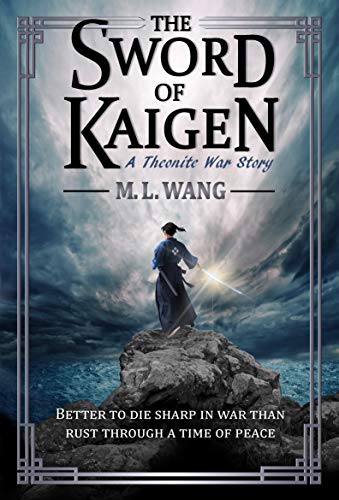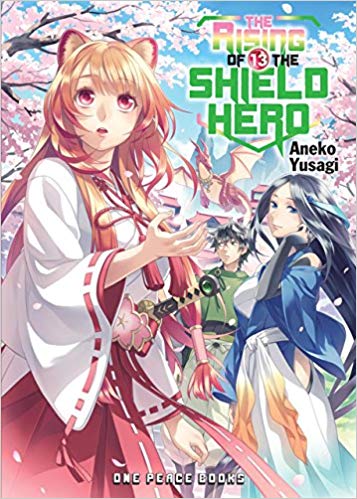
The Sword of Kaigen, by M. L. Wang, is one of the most ambitious fantasies of the year, which in turns, becomes the novel’s main strength and weakness. Grounded heavily in the school of fantasy that depicts historical Earth cultures in new settings, clothes, and names, Sword draws upon meticulous research of feudal Japan and West Africa to create a living world where a traditional warrior village comes under attack from its historical foe and modernity itself.
Two members of the Matsuda clan struggle with their standing in the village. Teen-aged Mamoru must learn to live up to his famous warrior father’s legacy while reconciling the romance of his duty with the uglier truth. Meanwhile, his mother Misaki tries to live up to the expectations of a warrior’s wife, even though her heart remembers her wilder and freer youth. As if to echo the storm in their hearts, invaders call a magical storm down on the village, and both Mamoru and Misaki must put aside their concerns to ensure the village survives long enough for the Emperor’s airplanes to drive away the foes. The ensuing character study and prolonged clash between magically-empowered samurai and Chinese-style magic-cultivating martial artists offer insight to each other without disrupting the frantic flow of battle. The result is one of the most impressive set pieces in recent fantasy that should not be missed by japonisme and action enthusiasts.
However, ambition begins to unravel the spell Sword weaves. The heavily historical worldbuilding requires frequent usage of the glossary to learn the meaning of terms that should be explained in the text, either explicitly or through context. What good is such an immersive setting if the reader has to pull away on a regular basis just to understand what is happening? Also, The Sword of Kaigen is a prequel to Wang’s Theonite series and tries to be three books at once. The story is keenest when it follows Mamoru’s struggles with warrior duties and expectations as they carry him into battle. The longest thread is Misaki’s character study as a mother struggling between the demands of her station and her spirit, only to find that neglecting one is to neglect both. Remarkably, given our times, Misaki never casts away tradition to follow her heart, but seeks ways to satisfy the demands of both. However, the time setting up Misaki’s childhood flame’s involvement in the main Theonite books becomes an unwelcome intrusion that only adds length to an already heavy tome. These science-fantasy and super-hero passages lack the vivid verisimilitude of those spent on the Japanese-inspired country of Kaigen, and are often at jarring odds with the rest of the book. Worse still, this heavy lifting for the main series extends the novel well beyond its natural and satisfying denouement. The Sword of Kaigen desperately needs an editor, not to make it readable, but to refine excellence into greatness.
That said, I still recommend it for the verisimilitude of the Japanese setting, the character studies, and the jaw-dropping battle.
 The thirteenth volume of Aneko Yusagi’s Rising of the Shield Hero continues the adventures of the controversial hero. Naofumi Iwatani, the Shield Hero of the title, is an anti-hero summoned into a Dragon Quest-inspired blue-slime fantasy world from Japan. But it is not Naofumi’s often distasteful actions that has garnered the controversy, but the event that embittered him. For within days of his summoning to his new fantasy home, the princess of the realm falsely accuses him of rape. With his reputation sullied and dodging all the kicks he could ever want from the people he is supposed to protect, Naofumi is forced to rely on unsavory and immoral methods to keep himself alive long enough to face down the waves of monsters threatening the land. And, perhaps at the end of it all, go back home to Japan.
The thirteenth volume of Aneko Yusagi’s Rising of the Shield Hero continues the adventures of the controversial hero. Naofumi Iwatani, the Shield Hero of the title, is an anti-hero summoned into a Dragon Quest-inspired blue-slime fantasy world from Japan. But it is not Naofumi’s often distasteful actions that has garnered the controversy, but the event that embittered him. For within days of his summoning to his new fantasy home, the princess of the realm falsely accuses him of rape. With his reputation sullied and dodging all the kicks he could ever want from the people he is supposed to protect, Naofumi is forced to rely on unsavory and immoral methods to keep himself alive long enough to face down the waves of monsters threatening the land. And, perhaps at the end of it all, go back home to Japan.
Over the preceding twelve volumes, Naofumi has managed to scrape together a handful of companions, clear his name but not his reputation, and knock enough sense into the Spear, Sword, and Bow Heroes to get them to stop treating this isekai portal fantasy world like a video game. But when a neighboring country continues to send assassins after Raphtalia, the Shield Hero’s trusted companion–for admittedly minuscule levels of trust, Naofumi decides to travel to its capital to put his foot down. There, the Shield Hero finds that the government freely welcomes his arrival–as an excuse to kick off a war. Now, to save Raphtalia and the citizens of this new land, Naofumi must overthrow the nobility before war and the next wave of monsters arrive.
Like Konosuba, Rising of the Shield Hero is a genre-savvy take on the saturated portal fantasy sub-genre. Instead of humor, Yusagi chooses a more realistic approach, exposing flaws in many isekai tropes, including slavery. Rather than soak Naofumi in unearned adulation, he receives unearned scorn, and the infinite blessings of most isekai heroes are now curses. Although Rising of the Shield Hero is billed as a revenge fantasy, it is instead the story of a spiteful man trying not to give into his rage as he still tries to do the right thing, even as he is too damaged to do it in the right way. The result brings restraint and actual moral complexity to what would otherwise be a standard power fantasy.
At thirteen volumes, the plot is starting to meander a bit. Naofumi’s confrontation with the power-mad noble who wants Raphtalia dead lingers for too long, and could have been condensed into a shorter, quicker tale. Which is a shame, as the translations are excellent, with and ear and an eye to English readability instead of the often confusing line-by-line translations that are the standard for light novels. A reader can actually tell which character is saying what line of dialogue, which makes Rising of the Shield Hero an excellent introduction into Japanese light novels. Provided the reader can excuse Wheel of Time-style traveling fantasies and frequent diversions from the main plot.
Rise of the Shield Hero as an anime has been…okay. points to overcoming the first 20cminutes of episode 1, which were absolutely awful.
This lines up pretty closely with my view of The Sword of Kaigen, although I probably liked it more overall.
https://everydayshouldbetuesday.wordpress.com/2019/02/19/the-sword-of-kaigen-is-a-character-driven-fantasy-with-maybe-the-best-set-piece-ive-ever-read/